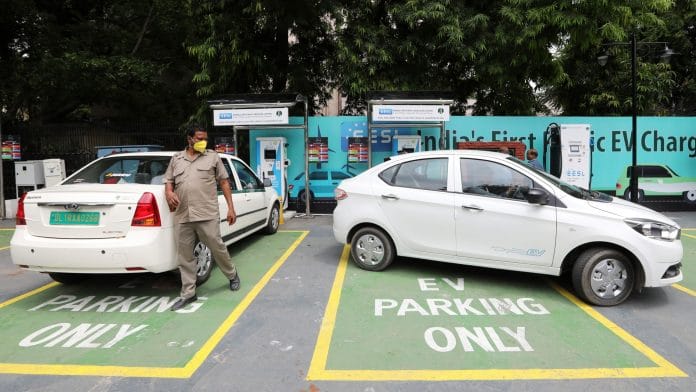Maruti-Suzuki has delayed the deliveries of its first electric vehicle, the eVitara, to September. Coupled with lukewarm demand for other recent electric vehicle launches, such as the Hyundai Creta electric, has sparked whispers in the automotive industry about India’s electric vehicle future.
Even if we set aside China and the US, smaller car markets such as Thailand are far ahead of India—EVs account for almost 12 per cent of new car sales there. According to Bloomberg data, it is the rapid growth of EV passenger vehicle sales in some of these countries that is truly astounding. In Brazil, sales of EVs climbed 500 per cent between 2022 and 2024; Thailand saw growth of 279 per cent, and Mexico wasn’t far behind. Australia clocked in at 145 per cent. All these countries are mature car markets.
In the last financial year, sales of electric passenger vehicles in India stood at 110,748 units, according to data from the Ministry of Road Transport and Highways’ VAHAN portal. That’s an 11 per cent rise on paper—but no matter how one slices and dices the data, this forms a minuscule proportion of overall car sales in the country: just over 3 per cent. And that’s despite the noise being made by carmakers with a rash of EV launches over the past few months.
Need for commercial uptake
But that might be the wrong angle to look from. “I believe the uptake of electric vehicles will happen in India, but as we are seeing, it will be commercial vehicles that will take the lead. Commercial vehicles account for around 10 per cent of ‘carpark’ of vehicles in India but 70 per cent of the fuel consumption,” Kunal Khattar, Founder, AdvantEDGE, a green mobility company, said. “And it is only logical that these vehicles should be pushed towards electrification first, followed by two-wheelers. While electrification of private passenger cars is a gold standard, there are still a few infrastructure issues before one can convince most Indian car buyers to go electric. And there is also the higher rate of depreciation of EVs thanks to rapidly improving technology, which isn’t a major issue in simpler two and three-wheelers.”
The brand director of a foreign carmaker in India said that the issues go a bit deeper than simply infrastructure.
“In my opinion, there are two problems with EVs in India. One, of course, is the rapid rate of evolution of electric vehicles, it is like the early days of smartphones right now. The changes between the 2024 and 2025 models of an electric vehicle, even if they look the same, are dramatic. This is a global issue, but in India, I do believe that many car buyers are holding out on purchases because of the government’s flip-flops on EV and trade policy,” he said.
The brand director added that carmakers don’t get to know if a trade agreement is on the way or not. And unless they know how automobiles and especially electric vehicles will be treated, it’s difficult to launch a car today.
“It makes no sense for me to import and launch a vehicle at Rs 50 lakh today and then in three months time cut the price to 40 lakh. And I believe customers know this as well,” he added.
Also read: Import duties, Trump, and Tesla—India’s auto sector caught in the crossfire
The China problem
As per the Bloomberg report, in each of the markets where sales of electric vehicles have boomed, the countries have been relatively open to Chinese carmakers, especially BYD. The Chinese carmaker sold 3,72,615 vehicles in April, and 1,95,740 units of those were pure battery-electric cars. BYD has set itself a target of selling 5.5 million cars this year. Basically, in one month alone, BYD sold almost double India’s annual EV sales. Their annual sales target a million more than India’s total passenger vehicle sales, which stood at 4.3 million in FY 2025—incidentally, BYD India sold around 400 units in April.
That last number says a lot about why EV adoption has been weak in India, the country’s hesitation to welcome Chinese carmakers—who make the best and most EVs in the world– has meant fewer options for Indian buyers. However, things might be shifting. MG Motor India, part of China’s largest auto giant Shanghai Automotive Industrial Company (SAIC), entered a joint venture with Indian conglomerate JSW and ramped up production. MG Windsor has rapidly grown to become India’s best-selling EV, proving that even in this market, a well-made Chinese EV will sell. I’ll be driving the updated MG Windsor Pro next week and, simply from a price-value proposition, I expect it to blow the competition out of the water.
But this is where the Indian government finds its hands tied. Even with a recent thaw of sorts, where do China-India relations stand today? Most Indian EVs, including two and three-wheelers, are using Chinese Lithium cells and are, by value, 30-40 per cent Chinese. While states like Delhi and Maharashtra are promoting EV adoption, more industrial and possibly even demand-side intervention is needed if the government wants to grow electric vehicle sales—beyond just establishing fuel-efficiency norms. There is a growing sense that the government has been dilly-dallying on electric vehicles, which has directly impacted sales.
It is time India gets a firm national mobility energy policy for electric vehicles, and even hybrid and natural gas vehicles. This needs clear timelines, and should not be left to the whims of state-level policy-making.
@kushanmitra is an automotive journalist based in New Delhi. Views are personal.







The biggest hurdle is charging facilities on highways. Till now EV are seen as city vehicles.
Socialist Modi and socialist India are allergic to Chinese EVs. They want Indians to suffer with overpriced Indian EVs.